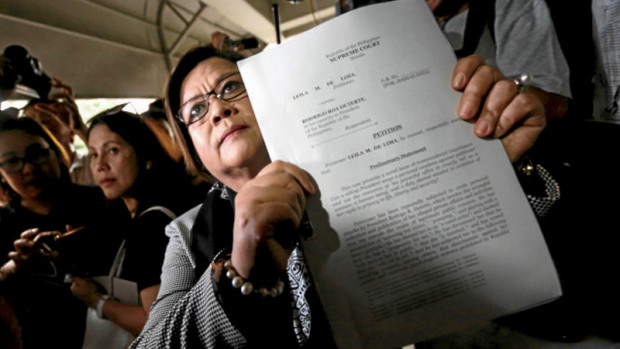Senator Leila de Lima has proposed a measure that would expand and strengthen the mandate of the Commission on Human Rights (CHR), citing its crucial role in addressing human rights violations, enforced disappearances and extra-judicial killings.
De Lima, a former CHR chair, has filed Senate BIll No. 1230 which aims to give the agency its own charter, a step that would “grant it its status as the country’s premier human rights body vested with powers to respond in real-time to human rights violations against Filipinos here and abroad.”
The lawmaker, among the staunch human rights advocates in the chamber, made the proposal as the CHR continued to investigate alleged summary killings as the Duterte administration pursued a relentless war on drug users and pushers.
De Lima said that while the CHR had “proven its exemplary work as a cornerstone of human rights in the country,” a charter would be necessary to make the CHR “a partner” of the three government branches.
The commission has been operating without a charter since its inception in 1987.
“CHR is a partner of security forces in human rights education, the legislative department in rights-based approach to law-making, the judiciary in evolving breaches of human security through enforced disappearance, and intermediary between government and civil society,” De Lima said in a statement.
“To empower the CHR as an institution through a Charter will reinforce the recommendations and recognition of its contribution to safeguard fundamental rights and freedoms, and serve the higher purpose of institutionalization of treaty commitments,” she said.
The following are key provisions under De Lima’s CHR charter proposal:
- Perform its Gender and Child Ombud roles to promote and safeguard the rights, interests, and welfare of the marginalized and vulnerable sectors, notably children and women;
- Mandatory and continuing human rights education program for the military, police, and other law enforcement agencies, as well as public school teachers;
- Designation of human rights attachés in select Philippine embassies and consulates to address cases of human rights violations committed against overseas Filipino workers (OFWs);
- Grant of power to issue legal protective measures, such as writs of injunction, restraining orders, and cease and desist orders, without waiting for the court to exercise jurisdiction over the matter;
- Institutionalization of witness protection program to provide safety to witnesses as well as human rights defenders under threat and safeguard the integrity of evidence;
- Establishment of witness auxiliary protection service to provide security, shelter, relocation and livelihood assistance to witnesses and their families;
- Fiscal autonomy to allow it to operate independently of the Executive Branch to ensure the unhampered application and protection of human rights principles under any and all possible circumstances and;
- Establishment of Human Rights Protection Offices in 18 regions and provinces. CBB


